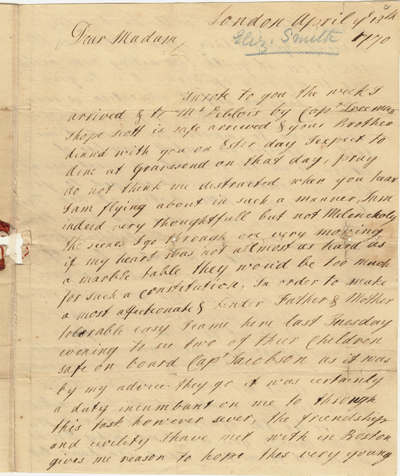
|
|
Elizabeth [Murray] Smith to Mrs. Deblois, 13 April 1770 J. M. Robbins Papers, After meeting her brother John's large family in Norwich, England, Elizabeth [Murray] Smith became concerned about her brother's ability to provide for his children, as well as with the children’s ability to support themselves. She soon developed a plan for her brother’s oldest daughter, Mary, nicknamed Polly, to become a retailer in America. Explaining her idea to her Boston friend Mrs. Deblois, Elizabeth outlined her attitudes about the effect of genteel education on young women. Elizabeth also arranged for her brother’s oldest son, known as Jack, to come to the colonies as well and learn to become a merchant. Together, Polly, 16, and Jack, 14, sailed for New England in the spring of 1770, before news of the Boston Massacre had reached England. Elizabeth’s musings on her niece and nephew’s departure and her role in the teenagers’ separation from their parents constitute one of the most expressive declarations on her part. For more on attitudes toward education, see Patricia Cleary, Elizabeth Murray: A Woman's Pursuit of Independence in Eighteenth-Century America (Amherst: University of Massachusetts Press, 2000), 18-20, 144-48; Cleary, “'Making Men and Women in the 1770s: Culture, Class, and Commere in the Anglo-American World,” in A Shared Experience: Men, Women, and the History of Gender, ed., Laura McCall and Donal Yacovone (New York: New York Uiveristy Press, 1998), 98-116 |
||
|
|||
 Elizabeth [Murray] Smith to Mrs. Deblois, 13 April 1770 J. M. Robbins Papers, Courtesy, Massachusetts Historical Society. Page 1
Elizabeth [Murray] Smith to Mrs. Deblois, 13 April 1770 J. M. Robbins Papers, Courtesy, Massachusetts Historical Society. Page 1
